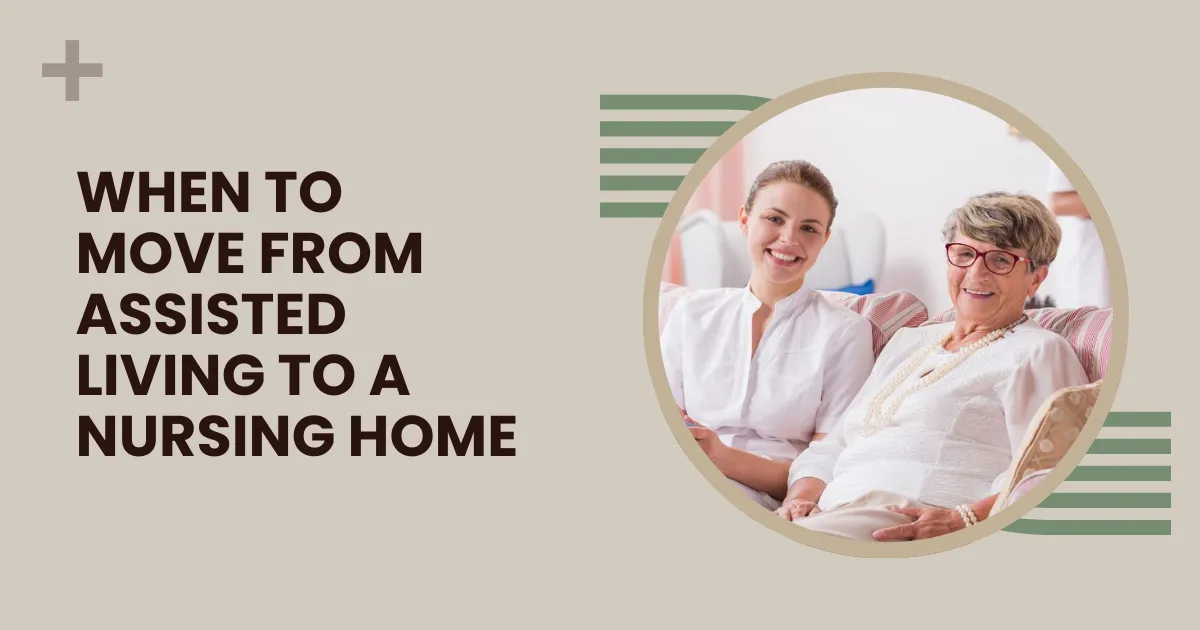
When to Move from Assisted Living to a Nursing Home
Anna had always been fiercely independent. For years, she lived on her own, managing her daily life with ease. But after a fall in her assisted living facility, things began to change. Simple tasks like cooking and getting around became more challenging. Her family noticed that she required more medical attention than the staff at her assisted living facility could provide. The situation became increasingly difficult to manage, and the question lingered: was it time to move from assisted living to a nursing home?
Many families find themselves in a similar situation, unsure of when their loved ones need more specialized care than what assisted living can offer. Understanding when to make the transition is essential for both the safety and well-being of the individual. Moving from assisted living to a nursing home can be a big decision, but it is often necessary when medical needs increase. In this article, we’ll explore the signs that indicate it’s time for this transition and help you make an informed choice.
When Is It Time to Consider a Move from Assisted Living to a Nursing Home?
The Role of Assisted Living
Assisted living is designed for seniors who need help with daily tasks but are still relatively independent. It typically offers assistance with activities like bathing, dressing, and medication management. However, it is not equipped to provide the level of medical care that nursing homes offer.
While assisted living is a great option for many seniors, there are circumstances when the needs of an individual surpass the capabilities of these facilities. Let’s explore some of the key signs that might indicate it's time to consider a move to a nursing home.
1. Increasing Medical Needs
Medical Attention: When It Becomes Too Much
One of the most significant reasons for moving from assisted living to a nursing home is when medical needs intensify. Assisted living facilities provide basic support, but they do not offer 24/7 medical care. If your loved one develops a chronic illness or a severe injury or requires frequent medical attention, a nursing home may be a better option.
Nursing homes have trained healthcare professionals, including nurses and doctors, available around the clock. For example, if an individual develops conditions such as Alzheimer's disease or Parkinson's or requires post-surgery recovery, the level of care needed may surpass what a nursing home can provide.
2. Difficulty with Mobility
Challenges with Physical Movement
Another indication that it may be time for a nursing home is when mobility issues become more severe. Assisted living facilities are designed to help individuals with minor mobility issues, but if a senior experiences significant difficulty walking, standing, or managing tasks like getting in and out of bed, a nursing home provides the necessary resources.
Nursing homes have specialized equipment, such as lifts and ramps, and offer assistance with physical therapy, all of which are necessary for individuals who require more intensive care. This transition is crucial when safety becomes a concern, as falls or accidents due to mobility issues are more common in environments not fully equipped to handle them.
3. Safety Concerns
Protecting Your Loved One’s Well-being
The safety of your loved one should always be a priority. Assisted living facilities are generally safe, but if your loved one has a condition that causes confusion or memory loss, such as dementia, they may be at risk. Wandering, forgetting to take medications, or leaving the facility unintentionally are signs that a higher level of supervision is required.
Nursing homes are designed to provide 24/7 monitoring and security. They are staffed with professionals who are trained to handle emergencies and prevent accidents. If your loved one is increasingly at risk of injury due to cognitive or physical decline, a nursing home may offer a safer environment.
4. Cognitive Decline and Memory Loss
Memory Impairment and Cognitive Decline
As individuals age, cognitive decline can occur, leading to conditions like dementia or Alzheimer’s disease. Assisted living facilities offer support for those who experience mild to moderate cognitive impairment. However, as the disease progresses, the need for more specialized care becomes evident.
In nursing homes, there is a dedicated focus on cognitive care. Specialized staff, including neurologists and mental health professionals, are available to provide the care needed for those with advanced cognitive decline. If a senior’s memory loss or confusion becomes more pronounced, it is often time to consider transitioning to a nursing home for a more supportive environment.
5. Challenges with Daily Living Activities
When Tasks Become Overwhelming
Seniors living in assisted living facilities typically retain the ability to perform daily activities such as dressing, eating, and bathing with minimal assistance. However, if these tasks become overwhelming, requiring more time and support, it may signal that a nursing home is the next step.
A nursing home can assist with daily activities throughout the day, ensuring that your loved one’s care is always met. This includes help with dressing, eating, hygiene, and other personal care tasks that may no longer be manageable in an assisted living environment.
6. The Financial Consideration
Understanding the Financial Impact
Moving to a nursing home can be a significant financial decision. Assisted living facilities tend to be more affordable than nursing homes, but the cost of long-term care should not be the deciding factor. However, it’s important to weigh the costs against the level of care required. If a loved one’s medical or personal needs increase, a nursing home may actually be the more cost-effective option in the long run, considering the level of care provided.
Financial assistance programs such as Medicaid may also help cover the costs associated with nursing home care. It’s important to speak with a financial advisor and explore all options to make an informed decision.
Choosing the Right Nursing Home
Finding the right nursing home is a crucial part of the transition from assisted living to a nursing home. It’s not only about meeting medical needs—it’s about ensuring comfort, safety, and a sense of belonging. Use the checklist below to guide your search and make a confident, informed decision.
Accreditation and Licensing
Always verify that the nursing home is properly licensed by the state and holds relevant accreditations. These credentials confirm the facility adheres to healthcare standards and ethical practices.
Staff-to-Resident Ratio
Ask about the number of caregivers per resident. A lower ratio means your loved one is more likely to receive attentive and consistent care, especially during nights and weekends.
Activities and Social Life
An enriching schedule of programs, events, and social opportunities promotes emotional and cognitive well-being. Look for facilities that offer various activities modified to different levels of mobility and interest.
Location and Accessibility
A convenient location encourages frequent visits, which can ease the emotional transition for your loved one. Proximity also makes it easier to stay involved in their care and build strong communication with staff.
Cleanliness and Safety Measures
During a visit, pay close attention to the overall environment. Clean, well-maintained facilities with safety features such as grab bars, non-slip flooring, and emergency call systems reflect a commitment to resident welfare.
Conclusion
Deciding when to move from assisted living to a nursing home is never easy. However, understanding the signs—such as increasing medical needs, mobility issues, safety concerns, cognitive decline, and challenges with daily tasks—can help guide your decision. When these signs become apparent, it’s crucial to consider the move to confirm your loved one receives the proper care and attention they need.
Remember, nursing homes offer 24/7 care, specialized services, and a safe environment modified to those who require intensive medical and personal support. If you find that your loved one’s needs are escalating, it may be time to consider this transition.
Schedule a consultation today at The Walnut Villa to discuss your loved one’s needs and explore the best options for their care.
FAQs
1. What is the difference between assisted living and a nursing home?
Assisted living provides help with daily tasks like bathing and dressing but does not offer round-the-clock medical care. A nursing home, on the other hand, offers 24/7 medical supervision and more intensive personal care.
2. How do I know if my loved one needs to move to a nursing home?
If your loved one’s medical, cognitive, or mobility needs increase beyond what assisted living can provide, or if safety becomes a concern, it may be time to consider a nursing home for more specialized care.
3. What are the financial implications of moving to a nursing home?
Nursing homes tend to be more expensive than assisted living, but they may be more cost-effective in the long run due to the level of care required. Financial assistance programs like Medicaid may help with costs.
4. Can I visit my loved one in a nursing home at any time?
Yes, most nursing homes allow family members to visit their loved ones at any time. However, visiting hours may vary by facility, so it’s important to check with the specific nursing home for their policies.
5. What should I look for when choosing a nursing home?
When choosing a nursing home, consider factors such as the quality of care, staff-to-resident ratio, services offered, and reviews from other families. It’s important to visit the facility and ask questions before making a decision.

Facebook
Instagram